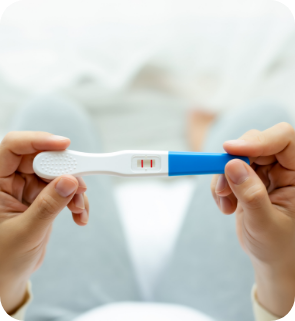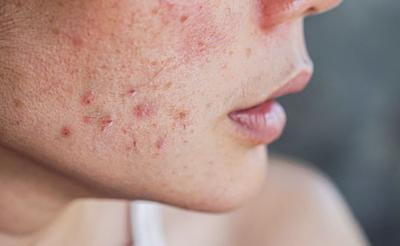
Inositol For PCOS: Benefits, Dosage & Side Effects
Inositol is the most well-researched and evidence backed supplement for polycystic ovarian syndrome (PCOS). Primarily referred to as myo-inositol, it is a small molecule that structurally resembles glucose, or sugar.
A common misconception still lingers in the minds of many, however, and that is: it can be known as vitamin B8. This is false given the fact that inositol is no longer thought of as an essential nutrient; but rather, a sugar-alcohol that is produced by your liver and kidneys.
Inositol supports several biological processes in the body such as fat metabolism, insulin signalling, and nerve functioning. It is these functions that make inositol particularly effective in treating insulin resistance (IR).
In this article, we examine the inositol benefits, and its effectiveness for managing various PCOS symptoms. Just know, ‘myo inositol’ and ‘inositol’ will often be used interchangeably throughout the article unless stated otherwise.
specialstart Inositol is the most well researched and evidence-backed supplement for PCOS specialend
What Is Inositol?
Inositol is a naturally occurring sugar-alcohol, and a term that collectively refers to molecules with a similar structure named stereoisomers. There are 9 forms or stereoisomers of inositols, with the two most common being myo inositol and d-chiro inositol.
However, myo-inositol continues to show the most promise for female fertility, restoring insulin sensitivity, and for reducing anxiety. Inositol was once thought of as an essential nutrient (vitamin B8) - that is, any nutrient that needs to be obtained from your diet.
In recent years, however, observations have shown that inositol can be produced by your kidneys and liver as a derivative from glucose. In addition to being produced by your body, inositol is found in a variety of foods such as beans, brown rice, and citrus fruit.
Of the ways to consume it, increasing in popularity is inositol supplementation - particularly for the treatment of PCOS. This is because myo inositol, whether it be in powder or tablet form, yields a higher dose than its natural occurrence in foods. The higher dose seems to be used more often and is more effective.
specialstart Supplementing with Inositol is more effective than deriving it from certain health foods specialend
Inositol Benefits
Insulin resistance and hyperinsulinemia affects between 65–70% of women with PCOS. According to multiple sources, particularly Dr Lara Briden who highlights this in her own work, insulin resistance is known to be a driver of PCOS and hyperandrogenism. This means, insulin resistance can be responsible for common PCOS-related symptoms such as infertility, acne, weight gain, low energy and fatigue.
specialstart Insulin resistance and hyperinsulinemia affects between 65-70% of women with PCOS specialend
The justification for the therapeutic use of myo inositol in PCOS derives from its activity as an insulin-sensitising molecule and its beneficial effects on metabolism. Specifically, myo inositol functions as a second messenger of insulin, and mediates different actions of insulin. This leads to a number of inositol benefits, with the first coming as no surprise:
1. Improves Insulin Sensitivity & Reduces Insulin Resistance
Inositol acts on the cells of your body as a secondary receptor to the hormone insulin. This is beneficial for insulin resistance as inositol acts as a second 'door' allowing insulin to unlock the cell delivering nutrients into the cell in a healthy process.
In other words, it improves insulin sensitivity and will help to reverse the symptoms of insulin resistance like weight gain, fatigue and tiredness, cravings, infertility and hyperandrogenism.
2. Improves Ovulation Frequency
Hyperinsulinism, caused by insulin resistance,increases the sensitivity of follicles to luteinizing hormone (LH) and inhibits liver production of sex hormone-binding globulin (SHGB) - a protein responsible for controlling the amount of testosterone that is available for use in your body. Thus, three problems arise:
- Follicles’ increased sensitivity to LH imbalances the LH/FSH ratio, which is crucial for ovulation;
- Inhibited production of SHBG leads to higher levels of free testosterone, or androgens;
- Insulin resistance increases ovarian production of androgens which exacerbates testosterone levels.
There’s good news, however: inositol is responsible for decreasing LH, in the LH/FSH ratio, and decreasing androgen levels (testosterone and androstenedione). By doing so, inositol restores menstrual cycle regularity and induces ovulation. [Reprod Health 18, 13 (2021)].
3. Reduces Free Testosterone Levels In PCOS
In a meta-analysis of randomised controlled studies, inositols (d-chiro and myo-inositol) were examined for their effectiveness in women with PCOS. Throughout the meta-analysis, a substantial increase in serum SHBG was observed only in studies where myo inositol was given for at least 24 weeks; and as we now know, SHBG controls the amount of testosterone available in the body.
This reveals a negative correlation between high SHBG and lower androgen levels in women with PCOS. Basically, when SHBG goes up androgen levels come down. Consequently, supplementing with inositol will cause an improvement in androgen-related symptoms like hirsutism (excess hair growth), acne, hair loss and infertility. [PMID: 29042448]
4. Improves Menstrual Cycle Regularity
A randomised, controlled trial was conducted in 2007 where 30 women with PCOS undergoing Intra-Cytoplasmic Sperm Injection (ICSI) were administered 4 mg of myo inositol daily.
Treated patients, compared with controls, experienced an increased frequency of spontaneous menstrual cycles, which reflects inositol’s efficacy for the treatment of infertility in PCOS. [PMID: 32308679]
5. Reduces Anxiety & Improves Mental Health
What the science and medical communities often fail to consider is the psychological burden that most symptoms create for women with PCOS. For some this burden can feel almost unbearable, quite often presenting itself as anxiety and/or depression. Reading about inositol’s potential to lift this burden by improving various PCOS symptoms should elicit excitement and curiosity.
But you can imagine the relief, joy and elation it creates when it actually happens. It is evident in our inositol supplement reviews, which we’re absolutely blessed to receive.
Check out our Inositol reviews, and see the joy for yourself.
Additionally, inositol can neurochemically improve depression, anxiety, and other mental disorders by stimulating the production of the hormones dopamine and serotonin. This theory is largely supported by research in which myo inositol concentration in blood is suggested to be a reliable marker for clinical depression.
Inositol Side Effects
While no supplement can be considered 100% safe, studies suggest that inositol is very safe at reasonable doses. In one study published in 2011, a group of 75 women with PCOS were given 4g of myo inositol daily for 15 months. When observed for adverse events, or side effects, none were reported.
In the same study, other groups, often treated for panic disorder and anxiety, were given much higher doses of between 12g-30g daily. Consequently, a number of side effects were reported:
- Nausea
- Diarrhoea
- Dizziness
- Headaches
- Tiredness
How To Take Inositol
Inositol can either be obtained from your diet as it is found in a variety of foods such as beans, brown rice, and citrus fruit or taken as a supplement, which is ever-increasing in popularity. Supplementation, whether it be inositol powder, capsules or tablets, is believed to be more effective than deriving it from glucose and health foods.
This is because inositol, at higher dosages, is more likely to achieve the desired result - studies’ suggest.
How Much Inositol For PCOS?
It is important to note that there is no recommended daily allowance (RDA) nor consistent dosing schedule for inositol. However, most studies and manufacturers suggest 3-4 grams daily or 2 grams twice daily for PCOS. It is believed, the higher the dosage the more beneficial inositol becomes for mental health disorders.
Despite 3-4 grams daily being the common dosage for PCOS, results and the rate in which they manifest often vary from person to person, as you would expect with most supplements. In this case, it is largely dependent on the degree of your hormonal imbalances and the nature of your goal(s), that is, why you are taking inositol in the first place.
**If you are wanting to understand more about your own hormonal imbalances and PCOS goal(s), our PCOS Starter Kit is the best place to begin x
This study might make help make it a little clearer: Involving 116 infertile women with PCOS, researchers set out to measure the effects of inositol supplementation. After 3 months of inositol treatment, researchers saw a significant improvement in participant’s metabolic and hormonal parameters which supports the improvement of insulin resistance.
After 6 months, the clinical pregnancy rate of the inositol treatment group was 45.5% - almost half of the treatment group. This is particularly promising when we consider that about 70% of women with PCOS struggle to get pregnant.
The rate and degree of results while supplementing with inositol may differ from person to person but studies clearly highlight its potential for improving PCOS-related imbalances and symptoms.
Summary: Benefits of Inositol For PCOS
- Improves Insulin Sensitivity & Reduces Insulin Resistance
- Improves Ovulation Frequency
- Reduces Free Testosterone Levels In PCOS
- Improves Menstrual Cycle Regularity
- Reduces Anxiety & Improves Mental Health
















